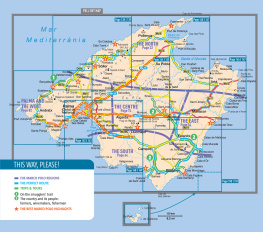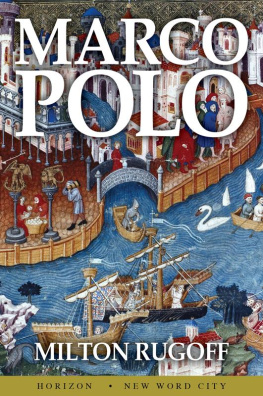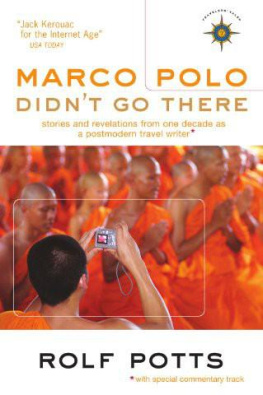The Indian Ocean, c. 1310
MARCO POLO
The Customs of the Kingdoms of India
Translated by RONALD LATHAM

GREAT
JOURNEYS
PENGUIN BOOKS
Published by the Penguin Group
Penguin Books Ltd, 80 Strand, London WC2R 0RL , England
Penguin Group (USA) Inc., 375 Hudson Street, New York, New York 10014, USA
Penguin Group (Canada), 90 Eglinton Avenue East, Suite 700, Toronto, Ontario, Canada M4P 2Y3 (a division of Pearson Penguin Canada Inc.)
Penguin Ireland, 25 St Stephens Green, Dublin 2, Ireland (a division of Penguin Books Ltd)
Penguin Group (Australia), 250 Camberwell Road, Camberwell, Victoria 3124, Australia (a division of Pearson Australia Group Pty Ltd)
Penguin Books India Pvt Ltd, 11 Community Centre, Panchsheel Park, New Delhi 110 017, India
Penguin Group (NZ), 67 Apollo Drive, Mairangi Bay, Auckland, 1310, New Zealand (a division of Pearson New Zealand Ltd)
Penguin Books (South Africa) (Pty) Ltd, 24 Sturdee Avenue, Rosebank, Johannesburg 2196, South Africa
Penguin Books Ltd, Registered Offices: 80 Strand, London WC2R 0RL , England
www.penguin.com
This translation first published as The Travels in Penguin Books 1958
This extract published in Penguin Books 2007
Translation copyright Ronald Latham, 1958
All rights reserved
Except in the United States of America, this book is sold subject to the condition that it shall not, by way of trade or otherwise, be lent, re-sold, hired out, or otherwise circulated without the publishers prior consent in any form of binding or cover other than that in which it is published and without a similar condition including this condition being imposed on the subsequent purchaser
ISBN: 978-0-141-96390-7
Marco Polo (12541324), a Venetian merchant, spent many years in the service of Kubilai Khan and in his journeys to and from the Khans court and around the Mongol Empire picked up immense amounts of direct and indirect knowledge about Asia. After his return to Europe he became involved in fighting between Venice and Genoa, was made a prisoner-of-war and in prison met Rustichello da Pisa, who wrote down the story of Polos adventures.
This selection recounts Polos knowledge of the countries around the Indian Ocean a hectic blend of correct, careful information and the wildest fantasy. It will never be established just what Polo saw himself and where he actually went, but his work introduced Europeans to a world which was almost entirely barred to them and it profoundly influenced centuries of exploration and imagination.
Hormuz, Persia and the Land of the Assassins
Here on the coast stands a city called Hormuz, which has an excellent harbour. Merchants come here by ship from India, bringing all sorts of spices and precious stones and pearls and cloths of silk and of gold and elephants tusks and many other wares. In this city they sell them to others, who distribute them to various customers through the length and breadth of the world. It is a great centre of commerce, with many cities and towns subordinate to it, and the capital of the kingdom. Its king is named Ruemedan Ahmad. The climate is torrid, owing to the heat of the sun, and unhealthy. If a merchant dies here, the king confiscates all his possessions.
In this country they make date wine with the addition of various spices, and very good it is. When it is drunk by men who are not used to it, it loosens the bowels and makes a thorough purge; but after that it does them good and makes them put on flesh. The natives do not eat our sort of food, because a diet of wheaten bread and meat would make them ill. To keep well they eat dates and salt fish, that is, tunny, and also onions; and on this diet they thrive.
Their ships are very bad, and many of them founder, because they are not fastened with iron nails but stitched together with thread made of coconut husks. They soak the husk till it assumes the texture of horsehair; then they make it into threads and stitch their ships. It is not spoilt by the salt water, but lasts remarkably well. The ships have one mast, one sail, and one rudder and are not decked; when they have loaded them, they cover the cargo with skins, and on top of these they put the horses which they ship to India for sale. They have no iron for nails; so they employ wooden pegs and stitch with thread. This makes it a risky undertaking to sail in these ships. And you can take my word that many of them sink, because the Indian Ocean is often very stormy.
The people here are black and worship Mahomet. In summer they do not stay in the cities, or they would all die of the heat; but they go out to their gardens, where there are rivers and sheets of water. Here they build arbours of hurdles, resting at one end on the bank and at the other on piles driven in below the water, and covered with foliage to fend off the sun. Even so, they would not escape, were it not for one thing of which I will tell you. It is a fact that several times in the summer there comes a wind from the direction of the sandy wastes that lie around this plain, a wind so overpoweringly hot that it would be deadly if it did not happen that, as soon as men are aware of its approach, they plunge neck-deep into the water and so escape from the heat. To show just how hot this wind can be, Messer Marco gives the following account of something that happened when he was in these parts. The king of Kerman, not having received the tribute due to him from the lord of Hormuz, resolved to seize his opportunity when the men of Hormuz were living outside the city in the open. He accordingly mustered 1,600 horse and 5,000 foot-soldiers and sent them across the plain of Rudbar to make a surprise attack. One day, having failed through faulty guidance to reach the place appointed for the nights halt, they bivouacked in a wood not far from Hormuz. Next morning, when they were on the point of setting out, the hot wind came down on them and stifled them all, so that not one survived to carry back the news to their lord. The men of Hormuz, hearing of this, went out to bury the corpses, so that they should not infect the air. When they gripped them by the arms to drag them to the graves, they were so parched by the tremendous heat that the arms came loose from the trunk, so that there was nothing for it but to dig the graves beside the corpses and heave them in.
In this district they sow their wheat and barley and other grains in November, and they have got in all their harvest before the end of March. And so with all their fruits: by March they are ripened and done with. After that you will find no vegetation anywhere except date-palms, which last till May. This is due to the great heat, which withers up everything.
Another feature of the ships here is that they are not caulked with pitch but anointed with a sort of fish oil.
Let me tell you next that when a man has died here, or a woman, they make a great to-do about mourning. Gentlewomen mourn their dead fully four years after death, at least once a day. They assemble with their kinsfolk and neighbours and give themselves up to loud wailing and keening and lamenting the dead. Since deaths are frequent, they are never done with mourning. There are even women among them who specialize in lamentation and are daily on hire to bewail the lost ones of other men and women.
So much for this city. We shall not touch on India at this point; for I will deal with it later at the appropriate time and place. Now I will turn back towards the north to speak of the countries in that quarter. We shall return by another route to the city of Kerman of which I have spoken, because there is no way of going to these countries except from this city. And you must understand that king Ruemedan Ahmad, whom we have just left, is a vassal of the king of Kerman.
Next page











